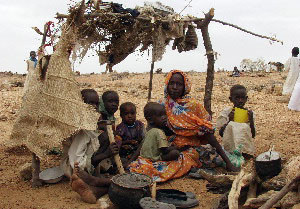
Millions of people in Darfur rely on aid agencies or the UN for food, healthcare, education and shelter.
Credits: Caritas
Darfur is in danger of becoming a forgotten emergency, according to Nyika Musiyazwiriyo, the outgoing Head of Programmes for the joint ACT/Caritas Darfur Programme.
“Darfur is slipping from our minds,” explains Nyika. “Funding for humanitarian work in the region has decreased substantially since the conflict first came to international attention. And Darfur is no longer a staple segment of our daily news shows.”
Yet, the problems remain.
“The needs of the people are just the same”, says the Zimbabwean. “Many thousands of people in Darfur still need support each day to access basic and vital things like clean water, food, and health care.”
Nyika, has worked for the ACT/Caritas Darfur Programme since 2007. By then, the original conflict between the central government in Sudan’s capital, Khartoum, and the rebel movements in Darfur had evolved into a much more complex conflict involving cross-border dynamics and political posturing with neighbouring Chad, inter-tribal violence, and increased banditry. The UN says that out of Darfur’s 6 million people, 4.5million still need support and 2.7 million people remain displaced throughout the region.
“Thousands of people are still living in camps,” explains Nyika. “Peace and security remain elusive – people do not yet feel secure enough to leave the camps and return home. And such living conditions mean people do not have the opportunity to build their own lives. They still need humanitarian aid to survive.
“Food, water and health care – all of these essential and basic things – still need to be provided on a daily basis as people cannot access these themselves.”
The ACT/Caritas programme, for example, ensures clean drinking water is made available to nearly 300,000 people living in eight densely populated camps for internally displaced persons (IDPs) in South and West Darfur, as well as in villages and host communities in the areas around these camps. The aim is to provide an average of 15 litres of clean, safe and portable water for each person living in the camps every day. This means digging new bore holes or wells, introducing motorized water bladders, or ensuring existing water supplies are well maintained. In the last three months, ACT/Caritas has provided over 200,000m3 of safe drinking water to these camps – enough to fill 80 Olympic swimming pools. Learn more about this programme…
Yet, for all the great work, as Nyika points out, there seems to be a huge contradiction in what is being done by humanitarian actors, including ACT/Caritas, and the lack of progress in getting people’s lives back on track.
Nyika said, “We, not just ACT/Caritas but the humanitarian community as a whole, have done so much to support the people of Darfur with basic services and life-saving activities. Yet, without peace and the ability to go home, the situation has not, and will not change.
“We have to keep providing the every-day things as people cannot access these themselves. And we will go on providing these basic needs. But we need the support of the international community, not just in terms of funding, but in seeking a peaceful solution to the conflict.
“Without funds we cannot continue supporting the millions of internally displaced people. Without security, and the right conditions that support their return, suffering will continue.
“We cannot let people forget what’s needed here.”
